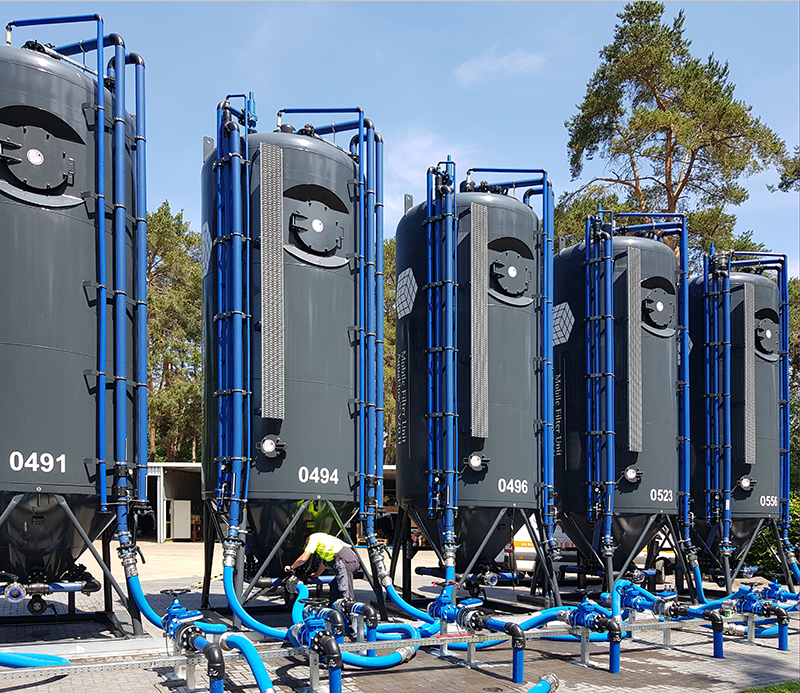
PFAS is a group of over 4,700 substances. This means that the contamination looks different in different places. Jacobi has both the knowledge and the equipment to take care of the various contaminants in the best possible way.
PFAS – Being part of the solution to a global problem
PFAS, dubbed the forever chemicals, are used to manufacture many household items and are now being found in water supplies and soil across the globe. These chemicals can have a detrimental effect on our health and governments worldwide are enforcing increasingly strict regulations to try and control the problem. Both activated carbon and ion exchange resins are effective solutions and are vital in tackling this complex and widespread issue.

“PFAS is a really complex issue to tackle. By combining the best products and application knowledge of our business units, carbon, resins and service, along with some strategic partners, we can make a difference by offering tailored solutions to people’s PFAS removal requirements. Our team are certainly made up of some great people who I believe can find us a way.”
Jan Reinier Gosker, Business Director, Jacobi Services EMEA
In recent years problems with PFAS (polyfluoroalkyl substances) being found in water supplies and soil have become increasingly prominent. PFAS are a group of thousands of chemicals that are linked to a number of serious and specific illnesses. Clusters of such illnesses are often found where PFAS are present in increased concentrations.
In industry, PFAS compounds are often referred to as ‘forever chemicals’. This is due to:
a) Their bioaccumulation – once they enter the body they are not readily excreted, and persistent exposure leads to levels that interfere with normal metabolic function. Peer-reviewed scientific studies have found links to cancers, liver malfunction, reduced immunity, reduced fertility, hormone interference, and developmental delays and behavioural changes in children.
b) PFAS compounds are very stable chemicals that are extremely hard to manage and break down.

Because PFAS can spread long distances via air and water, the substances can be detected in areas where no production or use of PFAS has ever occurred. These substances have been found in places as far away as the Arctic and in polar bears that live there. PFAS is a global environmental problem.
In their own right, these characteristics would not be highly problematic. However, PFAS molecules are often found in items we are in close and regular contact with. Water resistant clothing and footwear, non-stick cooking utensils and stain repellent upholstery to name just a few. They’re also a prime constituent in firefighting foam. Consequently, anywhere with a military base, fire station, regional and international airfield that has practised firefighting will have a highly concentrated and localised PFAS problem. Being so widespread means these chemicals have now found their way into drinking water supplies across the globe, creating something of a global crisis.
At present, the main geographical focus areas for PFAS removal are Europe and the USA, where problems have been identified and governments have imposed stricter regulations for safer levels of PFAS in drinking water a priority.
It’s an incredibly dynamic situation, with different limits in different areas and where regulations can change very quickly. It is expected that these regulations will become more stringent and more expansive as governmental bodies become more aware of the prevalence of PFAS contamination. Governments become more aware and, consequently, tighter on acceptable levels permitted in drinking water or soil. It is only a matter of time before authorities all over the globe demand low levels.

All PFAS are produced by humans and do not occur naturally. It is a group of very stable molecules that are very hard to break down. Therefore usually referred to as ‘forever chemicals’.
Treating the PFAS Problem
There are several methods that have already been shown to have practical capability in the removal of PFAS from water. Some are expensive to implement, may generate concentrated waste streams that are difficult to treat, or more suited to particular scenarios, such as land remediation. These include: reverse osmosis, bentonite-based coagulants, a combination of hydrogen peroxide and ultraviolet light, activated carbon, and resins.
At Jacobi, we offer our customers two of these methods (activated carbon products and resins), both of which are effective and synergetic. Indeed it has been proven that activated carbons and ion exchange resins are complementary technologies for the removal of PFAS compounds. Activated carbon works best on long-chain compounds, whereas ion exchange resins have a better affinity for short-chain molecules. On top of simply offering the necessary filter media, our Jacobi Services business also provides a full, comprehensive solution including ̒plug and play filter’ units, all logistics, technical support and media handling requirements. It’s a growing market with huge potential for Jacobi to help the environment.

PFAS compounds are notoriously hard to breakdown but activated carbon and ion exchange resins are an effective solution.
We have established a team dedicated to providing PFAS solutions to our customers, existing and new. The team is led by Isabelle Laidin, Water Application Manager, and Jan Reinier Gosker, Business Director of Jacobi Services EMEA, who combine their knowledge to offer the most up to date and effective solutions. Another key member of the team is Fabrice Chaud, Global Product & Technical Manager from the Jacobi Resins business. The goal here is to eventually be able to say ‘whatever your PFAS problem, Jacobi can fix it’.
To tackle the problem, we are also working with various partners that are experts in the field. For example, in Europe and the USA, we’re working with engineering companies who fulfil different roles in each region. In Europe their role is often as consultants to help deal with PFAS issues, investigating problems, recommending solutions and providing reporting after the treatment. To help deal with the issue Jacobi can provide the resins and/or activated carbon as well as filter units, but we will rely on strong strategic partners to help tackle the issue together.
With so many customers and potential customers, the PFAS market is set to become huge. At Jacobi we are able to offer two solutions that we know already are effective, however, the challenge the industry faces is treatment of PFAS to transform it to its least harmful state. Simply taking them out of the water or the solid waste isn’t good enough and it only solves half of the problem. A forever chemical needs a forever solution.

Non-stick cookware, found in many homes across the globe, is a known source of PFAS.
Solving the Problem for Good
Historically, PFAS has been moved from one place to another. As we learn more about how harmful this can be to our health, we become more aware of how vital it is that we eliminate as much of it as we possibly can, rather than move it around. We are able to filter out PFAS and even reactivate the carbon, but the big question is what happens with it afterwards? This is an industry wide problem, not specific to Jacobi.
At very high temperatures (like within a reactivation kiln) the PFAS bonds will be broken so that it is then in a less harmful form. However, the emissions that are given off can contain traces of unwanted components which can be released into the surrounding atmosphere. Using our capabilities and know-how, we are confident that Jacobi’s modern reactivation facilities will be fit for purpose in managing the ‘disposal’ of spent activated carbon used for PFAS removal.

Disposable food packaging is known to contain PFAS.
To supplement this capability, the applications laboratory at Jacobi is able to assess PFAS contaminated water to develop the most effective solution. As a part of this assessment, we routinely use external providers to support our analysis of the most effective treatment system to be used. The use of such accredited independent service providers allows an endorsement of the use of our media in the control of PFAS pollution.
There is not yet legislation in every country regarding PFAS limits and so the market is uncertain. As awareness grows, however, the market is expected to grow too.
If you are looking to learn more about how Jacobi can help you with PFAS removal, you can contact members of our specialist PFAS team Isabelle Laidin at isabelle.laidin@jacobi.net or Jan Reinier Gosker at janreinier.gosker@jacobi.net.
